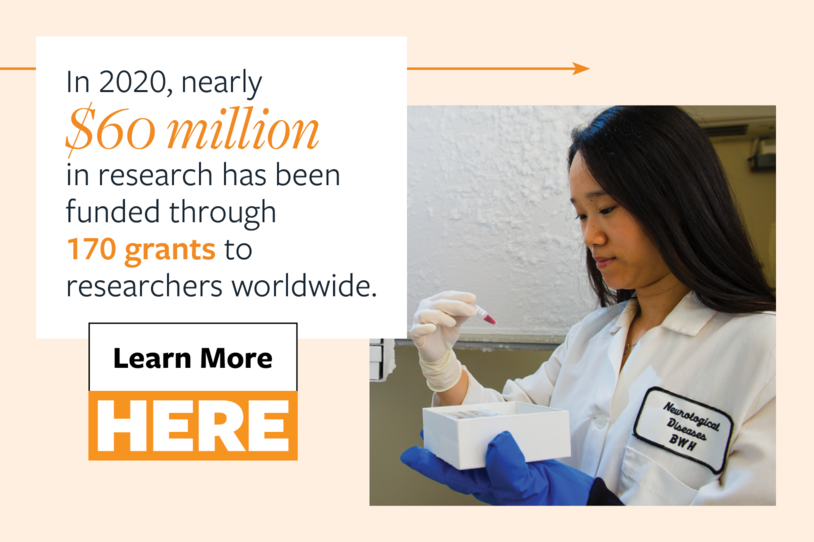
The following story appeared in our Fall/Winter 2020 edition of The Fox Focus on Parkinson’s newsletter. For this story and more, download the full edition.
Even in uncertain times, one thing is certain: The Michael J. Fox Foundation’s (MJFF) mission to overcome research roadblocks and enable progress toward tangible outcomes remains constant. Maintaining momentum in Parkinson’s research has been the Foundation’s top priority as we’ve spent this unprecedented year flexing to meet the needs of the scientific and patient community. And today, more therapies are coming to market, and more next-generation trials are advancing.
Early Investments Pay Off
In May, we marked another key achievement in the Foundation’s timeline, the second approval of an MJFF-funded therapy. Kynmobi from Sunovion Pharmaceuticals is an under-the-tongue film strip of apomorphine. Our Foundation funded early trials to give patients an easy-to-use option during “off” episodes when symptoms are not well controlled with oral medication.
Later this summer another new Parkinson’s treatment came to market — marking 17 in the past six years. Medtronic’s Precept deep brain stimulation (DBS) system records brain activity, which may help care providers assess and optimize DBS impact. From Science to Solutions Sustaining momentum requires focusing critical dollars to cutting-edge research with sound scientific rationale and great potential impact on patient lives. As this publication went to press, in 2020, we have committed nearly $60 million through 170 grants to researchers worldwide.
We are directing $1.6 million to Doris Du Wang, MD, PhD, at the University of California, San Francisco to test adaptive DBS for gait and balance. An adaptive system would stimulate the brain only when needed (rather than continuously), potentially leading to better outcomes and fewer side effects.
While the coronavirus has slowed some in-person trials, we are expecting more Foundation-funded studies to soon begin testing therapies for other hard-to-treat symptoms such as cognitive impairment and swallowing problems.
Onward Toward A Cure
In parallel, our urgent pursuit of therapies to slow, stop or even prevent disease also marches forward. We have devoted significant resources to profiling and safely pushing therapies against the LRRK2 protein (overactivity is associated with PD). In August, Denali Therapeutics announced a deal with larger pharma company Biogen to co-develop its LRRK2 drugs and move one into late-stage trials in 2021.
Also thanks to early investment from MJFF, the field of treatments against the alpha-synuclein protein — which clumps in brain cells in Parkinson’s — has grown to 13 approaches in human trials. A nearly $1.4 million grant to German company MODAG will move its novel therapy, anle138b, to a trial in people with Parkinson’s.
Other grants are going to novel programs testing a range of therapeutic strategies. Mya Schiess, PhD, at the University of Texas is receiving $2.25 million for a trial evaluating stem cells from bone marrow of a living donor to fight inflammation. In the laboratory, Joseph Patterson, PhD, at Michigan State University is examining a drug (terazosin) used to treat enlarged prostate for its impact on Parkinson’s progression after a study showed it may slow the disease. This diverse portfolio and holistic strategy providing funding and resources is accelerating progress toward more therapeutic options today and fewer diagnoses tomorrow.
